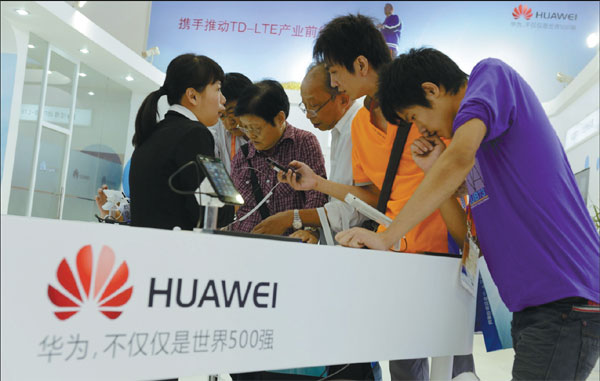Date for a new dimension
|
Huawei is the world's fourthlargest smartphone seller in the first quater this year. Provided To China Daily |
Huawei chose an auspicious time and place to launch its new smartphone
North London's Roundhouse, a legendary music venue that has hosted shows by rock legends such as Jimi Hendrix and Pink Floyd, was the stage last week for a debut act that its creators hope will become another potential superstar.
China's telecommunications giant Huawei chose the famous venue to unveil its latest flagship smartphone - and the world's thinnest - the Ascend P6.
It is the first time Huawei has launched a global product outside China, and is significant in underlining its ambitions to compete with Apple and Samsung in the top tier of mobile technology.
"This is the first stand-alone launch event for Huawei's smartphone. We want to get closer to customers, and we attach great importance to the European market," says Yu Chengdong, CEO of Huawei Consumer Business Group, adding that Huawei previously unveiled its handsets at major industry trade shows.
The company chose the launch date - June 18 - to tie in with the new smartphone's dimensions, 6.18 millimeters.
Founded in 1987, Huawei has grown to become China's biggest maker of telecommunication equipment, and has been selling smartphones under its own brand for the past three years.
Although popular in China because of relatively low prices, Huawei acknowledges it needs to do more to make Western consumers familiar with its name.
Now, with the Android-based Ascend P6, the company wants to prove its research and development ability and promote its brand internationally.
Huawei says it has designed one of the slimmest and narrowest circuit boards in the industry to accommodate the electronics in the new handset.
The Ascend P6 is made with metal and glass and less plastic than in previous Huawei models, Yu says, and was designed to cater for European consumers, who pay more attention to quality. "The launch of this higher quality handset is related to Huawei's own strategy of product excellence."
The P6 comes in white, black and pink, and in language more associated with skin creams, Huawei says the camera's "instant facial beauty support" software reduces wrinkles and blends skin tone.
Yu says Huawei wants to sell 10 million P6s globally, half of them in China. "We haven't reached that many units for a single smartphone before, but we are struggling to catch up with Apple, Samsung and to match the competition."
On sale from next month, and with a recommended price of 449 euros, it is cheaper than the latest iPhone, which costs 623 euros in the UK.
Industry analyst Ben Wood, of CCS Insight in the UK, says Huawei's target is an ambitious one, but it is off to a good start with strong pre-orders in the Chinese home market.
"The success ultimately comes down to their ability to adjust the device range with key network co-operators around the world, which means they should ally with the media markets," Wood says. "But marketing events are also necessary to ensure their products are very prominent in retail, and make the customers understand more about the Huawei brand.
"The launch event was very successful. The fact that they will be shipping the device to 19 countries is an impressive start, but there is still a lot of work to do."
According to data research firm IDC, Huawei sold 9.9 million smartphones in the first three months of 2013, making it the fourth-largest seller after Samsung, Apple and LG.
The top two sold more than 100 million units between them, while LG sold 10 million.
The Chinese market is the biggest smartphone market in the world, adds Wood, and that put Huawei at a significant advantage over rivals such as HTC, Nokia or Sony, which do not have such big home markets to build on.
In China's smartphone market, Huawei held a 10.1 percent share in the first quarter of this year, compared with Apple's 6.4 percent, data from Analysys International consultancy showed. South Korea's Samsung was market leader with 17.3 percent for the period.
"But don't forget, this year nearly 1 billion smartphones will be sold, so you don't need to have a huge market share," says Wood. "As long as they can ship 60 million units, it will still be a single-digit percentage share, but it will be profitable, and will be a great foundation to build on."
According to a recent study by Strategy Analytics, Samsung accounts for about 95 percent of all profits in the Android smartphone market, thanks to "an efficient supply chain, sleek products and crisp marketing".
That has led some analysts to question the wisdom of competing directly against the South Korean firm. But with Apple and Samsung taking the lion's share of profits from smartphones, operators and retailers are keen to redress the balance of power away from the duopoly.
At Huawei's P6 launch, Carphone Warehouse chairman Charles Dunstone took to the stage to describe Huawei as "the most fantastic partner".
However, in the United States, the situation is not so rosy, and politicians have discouraged telecom companies from buying its equipment. The US Congress last year warned that network equipment supplied by Huawei could be used for spying and called for its exclusion from government contracts and acquisitions.
Huawei has denied the claims and accused the US government of protectionism.
The Chinese firm has invested much money in R&D and marketing, Yu says, and he expects the latest P6 to work "miracles" for the brand.



















